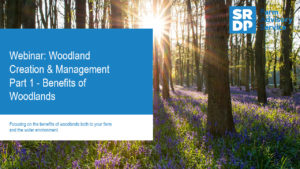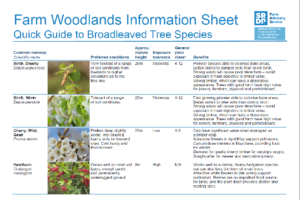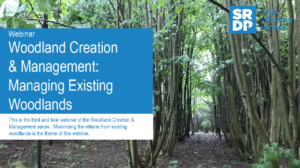Join FAS Events from home, catch up online
15 October 2020While we can’t run events in ‘real-life’ all FAS events are being held online. This means you can join events from the comfort of your own home and you aren’t restricted to only those taking place close to home.
Online events are usually about an hour-long, most happen in the evening, and there’s no travel time to factor in. Sign up on the FAS website and you’ll receive an email with a link to follow when it’s time for the event to start. It’s really that simple!
Joining online events on the day gives you the chance to ask questions and join in with live discussions. But if you can’t make it, or you see past events you’d like to see, you can watch the recordings, any time you like.
Upcoming woodlands event:
Woodland Creation and Carbon Sales
Wednesday 28 October, 6pm to 7pm
Learn more from two of the contributors to the latest, Autumn 2020 Farm Woodland News. Dr Vicky West of Scottish Forestry, who’s written about “An Introduction to Woodland Carbon – A Growing Source of Funding for Woodland Creation” and George Hepburne Scott of Forest Carbon, who has given a comprehensive insight into “How to Release Income from Woodland Carbon“. This interactive online event will help you understand carbon schemes and ask questions.
- Essential for anybody proposing a woodland creation project.
- Learn how carbon sales can improve the financial viability of your proposal.
- Understand how carbon sales work.
- Find out what the key rules are and if selling carbon is right for you.
Catch up with webinar recordings
Missed our Woodland Creation & Management webinar series in July? Catch up whenever suits you.
Part 1 – Benefits of Woodlands
- The importance of matching tree species to the planting site.
- The benefits of woodland for livestock productivity.
- How woodlands can increase biodiversity and the benefits this can bring.
- How woodlands can contribute to providing public goods.
Part 2 – Successful Woodland Establishment
- The importance of well thought out fencing and good ground preparation appropriate to the site.
- Choosing quality trees of the right provenance.
- Carrying out ongoing maintenance especially weeding.
- Obtaining additional funding from organisations wanting to mitigate the impact of their greenhouse gas emissions.

Part 3 – Managing Existing Woodlands
- Harvesting farm woodlands and getting the best value for your timber.
- Managing your native woodland to enhance biodiversity benefits, especially through woodland grazing.
- A case study of an Aberdeenshire farm where profitable thinning has been carried out and an FGS grant has been used to improve the woodland and farm access.
- Managing field and hedgerow trees.
Water Margin Management: Webinar 1 – Riverbank Management
Riverbanks act as a buffer to the water environment. They are a shield to pollution and a home for biodiversity. Restoring banks and creating new riparian woodlands can help prevent flooding, land loss and pollution, as well as provide valuable riparian habitat. Learn more about working with the natural forces of rivers and watercourses on your farm to slow the flow.
Information notes
We’ve published some quick reference guides, free to download and keep.
Quick Guide to Conifer Tree Species
Basic reference for the main conifer species suitable for producing timber in the UK. An expanded version of the species guide included in Issue 34’s article on growing alternative conifers for timber.
Quick Guide to Broadleaved Tree Species
Basic reference for the main broadleaved tree species suitable for woodland planting in Scotland, including habitat value and timber properties.
Obtaining Permission to Fell Trees
It’s illegal to fell trees without permission. A simple guide to help you navigate the application process.
Common Pests and Diseases of Trees
A summary of the most common problems, how to spot them, and how to deal with them.
Basic Advice about Accessing the Forestry Grant Scheme for Woodland Creation
A guide to how FGS funding for woodland creation works, with guidance on preparing a successful application.
Visit the Farm Woodlands section of the website to access all of our resources. For advice, you can contact the FAS advice helpline by telephone on 0300 323 0161, or by email to advice@fas.scot
Sign up to the FAS newsletter
Receive updates on news, events and publications from Scotland’s Farm Advisory Service



